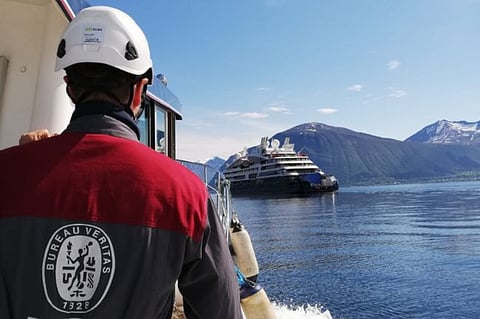

Classification societies are an interesting breed. They were originally established to ensure that ships were properly designed, constructed and equipped to the standard required to make them safe, seaworthy and, most important, insurable. They have come a long way since.
Several European and Asian countries and the United States have their own societies but usually only one per country. Most now have a substantial and influential presence in the global maritime industry.
This is the first year that Baird Maritime has made the award for Best Classification Society. Partly, this is because many of the vessels we reviewed have been subject to local rules and not enough have involved classification societies to make for a separate award.
Over recent years, however, we have noted rapidly increasing numbers of our reviewed vessels being built to class. We have also noted that a disproportionate number of the kinds of vessels we review here have been classed by Paris-based Bureau Veritas. Interestingly, of the 20 per cent of our vessels built to BV class in 2020, many of them are the most innovative and exciting. BV is certainly making its present felt globally in the workboat sector and that is a very good thing for our industry.
"We have always been very strong in small and specialised vessels," BV replied when asked by Baird Maritime why they are very well-regarded by owners and builders alike. "We have significant and specific expertise addressing market needs, combined with local support and relationships."
BV added that its corporate values include ambition and humility that enable the company to properly listen to the needs of the builders and eventual users of vessels to help them to realise their vision, all while remaining pragmatic and realistic in its approach.
To better address customers' needs, BV spent 2020 expanding its already impressive service portfolio, which already covers no less than 11,400 vessels worldwide, giving it the largest — and possibly the most diverse — fleet of any classification society.
"From late last year," said BV, "we began writing the Royal Australian Navy's requirements for new naval rules as well as providing specialised services addressing underwater radiated noise. These are just two specialised areas of consultancy activities that we have added to our lineup of offerings."
The company has also begun focusing more on decarbonisation and digitalisation. Further, it updated existing rules for ships and added new ones. These included BIORISK notations addressing operational and design requirements for safety and hygiene, new rules for wind assisted propulsion, new notations for ultra-low emission vessels (ULEVs), and cyber safety and cyber security standards.
Although BV has admitted that the Covid-19 pandemic made its situation particularly challenging, it continued to do business nonetheless.
"Shipping kept going and classification services were still required," BV told Baird Maritime, "so 2020 was a very busy year for us. We saw some landmark deliveries of new ships like the largest gas-fuelled ships ever built as well as many small specialised ships, many of which you are recognising in your Work Boat World 2020 awards."
Remarkably, the Covid-19 pandemic also gave BV an opportunity to fully demonstrate the feasibility of remote inspections and surveys using ROVs and even aerial drones.
"We were able to take advantage of the digital tools that we had had under development in order to make such inspections and surveys possible," said BV.
Even with these advancements, the company has claimed that shipbuilding activity worldwide will be proceeding at a slow pace early in 2021.
"Globally, newbuilding orders are very low as both market and regulatory uncertainty have slowed many owners' plans in the deep sea shipping trades, which then resulted in reduced activity in major shipyards. But we have seen considerable continued interest for gas ships, for many specialised assets, including naval and fishing vessels and for our consultancy services."
Overall, though, BV has continued to be very positive on its outlook for the marine and offshore sectors. Reasons for this outlook include projected orders for more sustainable ships.
"For example," the company explained, "in the offshore wind and marine renewable energy markets, we are very active in providing services for the development, construction and operation of the specialised assets will be required as society shifts to 'green' energy."
When asked about the future of the classification society industry, BV commented that sustainability will have a continually growing impact on the industry.
"The health and wealth of the seas and oceans are vital for the future sustainability of society," BV told Baird Maritime. "Class societies have a growing role to play in supporting the safety, security, and sustainability of all marine activity. We started 200 years ago by providing information to insurers to help them understand marine risk, and our stakeholders have now expanded considerably. Our role today and tomorrow is to help shape a world of trust for all marine stakeholders, including the sea itself."
